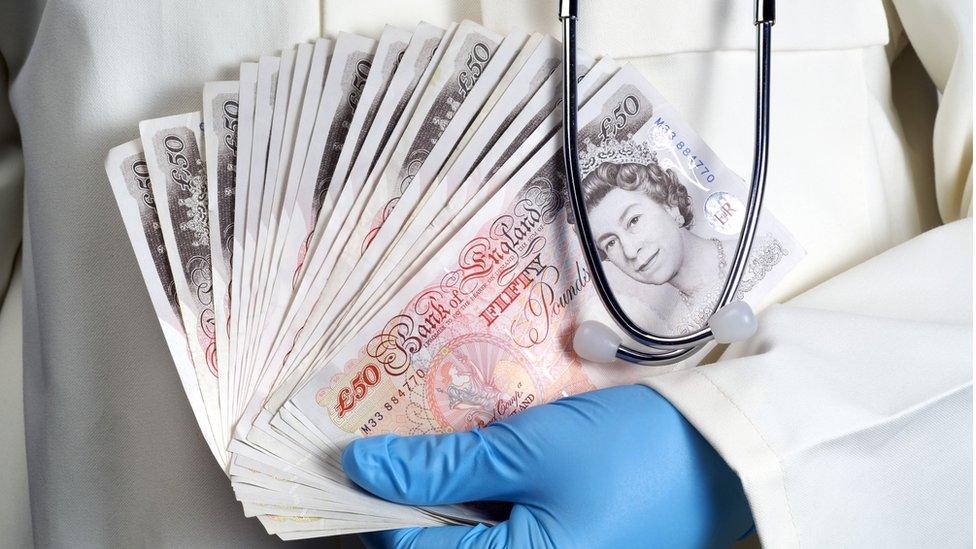NHS finances - the short, the medium and the long term
- Published

Taking a view on the health of NHS finances in England depends on what time frame you are looking at. Short term there are intense pressures, further ahead things might get easier while in the long term there are considerable uncertainties.
Swirling around Whitehall are rumours that the Department of Health's spending limit for the current financial year may be breached.
The 2015/16 year will come to an end in under two months time, but its understood to be touch and go as to whether the funds already allocated by the Treasury will keep the show on the road.
In the last financial year the department staggered over the line with a surplus of just £1m on spending of more than £100bn, equivalent to pennies after the bills have been paid from a monthly salary cheque.
The outcome this year is highly uncertain not least because the flow of extra patients into hospitals has continued to outstrip the increase in NHS budgets.
Hospital trust budgets have ballooned with little evidence of surpluses elsewhere in the system to balance this red ink.
The Department of Health can always turn to the Treasury for more money, but this would have to be voted on in parliament, leaving the government open to accusations from Labour that it had lost control of the public finances.
Serious questions would be asked of ministers and civil servants by the National Audit Office.
Sleepless nights
One government source acknowledged that things were "very very tight" with health finances.
There seems, though, to be an expectation that the department will just about make it to the end of the financial year on March 31st without the need to extend a begging bowl to the Treasury. But that still means weeks of sleepless nights for Whitehall mandarins.
Looking beyond March, the government believes that the picture gets rosier. Ministers argue that the £3.8bn above inflation boost for the NHS in England next year will give the whole system more breathing space.
They argue that hospitals will get the funding they need as long as they focus on tackling the underlying causes of their deficits.
Longer term, the big question is whether the £22bn of efficiency savings pledged by Simon Stevens, head of NHS England, for 2020 can be achieved.
Lord Carter's report sets out in some detail how £5bn of that might be delivered.
The NHS in winter: Want to know more?
For the latest news, analysis and video
Winter across the UK: A guide to how the NHS is coping
Video: Why hospitals are under so much pressure
Video: How a hospital can grind to a halt
He describes how variations across different trusts on spending practices and policies could be ironed out resulting in significant savings. He also notes that some hospitals are amongst the safest and most efficient in the world.
But that still leaves another £17bn of savings, and there is little detail on that beyond hopes that prevention and community care initiatives will keep patients out of hospital.
Back to the short term - and Chris Ham, chief executive of the King's Fund, had a blunt assessment in The Times on Friday where he said the NHS was facing "the biggest financial crisis in its history".
He argues that the high costs of a greater focus on patient safety , including agency staff bills, have left many hospitals unable to balance their books.
Ministers believe that there is fair weather on the horizon for the NHS with higher funding pledged by the government in return for promises to get better value for those resources.
Right now, though, they will be looking only a little way ahead with financial storm clouds closing in.
- Published5 February 2016